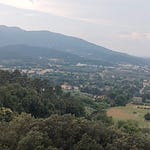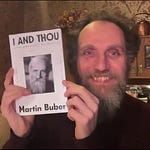North wind has been blowing for days, slowing the acceleration into spring, but on days when the sun is out, it’s clear enough that summer is coming.
April was a month of writing and delivering talks, a couple of which will emerge as essays here before long. In May, I’d usually be teaching an online series with a school called HOME, but this year, those weeks are going into framing up the new book. I’m past the Rubik’s cube phase, now it’s more a case of setting up the dominoes, so that when it’s time to write a first draft, they will topple into place as intended.
Meanwhile, this morning found me at Skogsvallen, the community-run music venue that regular listeners to The Great Humbling will have heard me talk about. While we were waiting for a delivery to arrive, I thought I’d record another of these In-Between Videos.
The theme today is writers and writing – and I might as well say upfront that, on this occasion, the examples I’m drawing on are all white European men of my father’s or my grandfathers’ generation. If you’ve been around for anything length of time, then you know this is not the only place I go for inspiration. But what prompted this video was Jonathan Coe’s unconventional biography of B.S. Johnson, Like a Fiery Elephant – and, specifically, the affinity which John Berger felt for Johnson.
There are a number of good reasons why Berger should have felt a kinship with Johnson, yet there’s also a strangeness to the relationship between them – at least on the face of it – since Berger came to see himself as, above all, a storyteller, while perhaps the best-known passage in Johnson’s work is the moment near the end of Albert Angelo when the author rips through the veil of fiction – “OH, FUCK ALL THIS LYING!” – going on to declare that “telling stories is telling lies”.
As I reached the end of Like a Fiery Elephant, I found myself thinking back over Berger’s work, which was so formative for me, and two thoughts came into focus. First, if Berger hadn’t made it beyond his forties, then the body of work he left us would make the parallels to Johnson a good deal clearer. And secondly, in the turn that he made in the mid-1970s, which led to the writing which matters so much to me, the writing in which he became a storyteller, Berger wasn’t turning against the call to stubborn honesty which drove Johnson, so much as finding a way to live out that call which had eluded both of them as younger men. In the second half of his life, he came as close as anyone in our time to a way of “telling stories” that is not “telling lies” – indeed, I don’t think it’s an overstatement to call the body of Berger’s work a war against lies.
You’ll find a fuller exploration of these thoughts in the part of the video that is behind the paywall – and, as always, if your circumstances make it difficult to take out a paid subscription, just drop me a note and I’ll comp you one.
I haven’t been able to pin down where I first learned about how Berger was affected by Johnson’s death, though this is confirmed by Coe’s interview with him in Like a Fiery Elephant. The sense that Berger, too, was haunted by a “demon” during the early 1970s, one which it was by no means obvious that he would outrun, comes from Anthony Barnett’s essay on ‘John Berger and the Booker Prize’. And Kathryn Edwards brought me back to this passage from Joshua Sperling’s A Writer of Our Time, addressing that turn in Berger’s work that coincides with his arrival in the Haute Savoie:
He all but abandoned the critical mode. His ambitions now expressed themselves not so much through any single creative work, but in a life project out of which, almost like by-products, arose a range of stories, poems, missives and sketches. The tone grew intimate and caring. The scale switched rapidly from the smallest of observations of the natural or animal world to the metaphysical.
That gives a clue to how Berger fulfilled the Johnsonian quest for a radical fusion between writing and life1 – and it’s one of the quotes that’s travelling with me in this current season of writing. The other one, mentioned in the opening of the video, is from Wendell Berry in Port Royal, Kentucky, writing to his friend Gary Snyder (the letter is published in Distant Neighbors):
What I’m feeling more and more inclined to argue, in other words, is that there’s no “high culture” without low culture. No use talking about getting enlightened or saving your soul if you can’t keep the topsoil from washing away. No use expecting excellent art if there’s no excellent farming and carpentry. This is hard (and instructive) to deal with because, of course, it means that I’m in the wrong lifetime to expect Port Royal to produce an excellent poet. I’m in the wrong lifetime to even get a good glimpse of what the excellence of an excellent Port Royal poet might be.
That is so hard for me to think because I came along under the specialist system in the arts, which proposed among other things that diseased society could be ransacked for the “subject matter” of “great poetry”—a notion full of silliness and despair. I think, now, that our work must settle for being, at best, a fragment of a glimpse of a better possibility. Speaking for myself, I’m pleased with that conclusion. I see a lot more hope and satisfaction in that than the possibility of making an “artistic triumph” out of the ruin of the world.
There’s a lot there that speaks to my own understanding of what kind of writing is possible today, and also to the themes I’m writing about in the new book.
Thanks, as always, for your support – and, oh yes, if you’ve not found your way to it already, here’s the new episode of The Great Humbling that Ed and I dropped a couple of weeks ago…
Look out for a new-old essay coming in the next week or so, revisiting a piece I wrote for one of the earliest Dark Mountain books – and another In-Between Video next month, when Anna, Alfie and I will be on the road, travelling to Italy for a gathering of the friends of Ivan Illich. Meanwhile, thanks again for sharing these journeys.
DH











